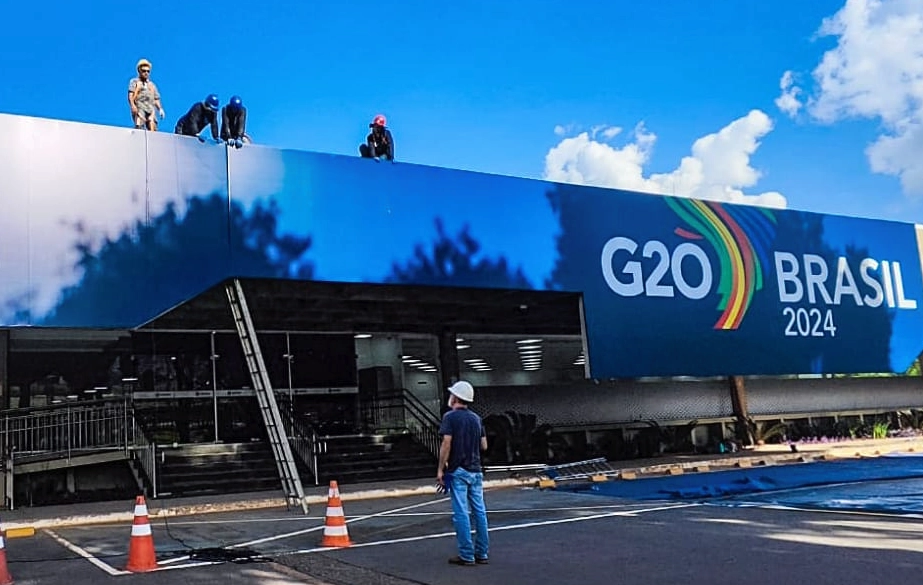In November, Brazil will host in Rio de Janeiro the 19th G20 Summit (group of the world’s 20 largest economies), which promises to leverage the motto of President Lula’s third term “Brazil is back”, uttered during the United Nations Climate Conference (COP27) in Egypt in 2022. However, perhaps the gerund phrase “Brazil is coming back” better captures the expectations of the actors involved with the G20. This is because of a prevailing idea that the G20 should be understood as a process with cumulative formative developments for the subsequent roles that Brazil will take on in 2025 with the presidency of the BRICS and COP30 in Belém. These positions, combined, could contribute to Brazil’s active repositioning on the international stage.
One of the gains envisioned with Brazil’s presidency of the G20 is the promotion of public debate on international issues, traditionally perceived by a large part of the population as distant, abstract, or of lesser importance. This perception has partly motivated the criticism articulated by the opposition and public opinion of the president’s international trips, who in 2023 traveled to 24 countries and spent 75 days abroad. Many of these criticisms are based on assuming the focus on international issues distracts from domestic problems. However, can we treat these spheres as disconnected? The priority issues, the choice of which is the prerogative of the rotating presidency of the time, announced by Lula during the 2023 G20 Summit in India (fighting hunger, poverty, and inequality; climate change and reforming global governance) clearly demonstrate this connection between domestic and international issues.
Activism against inequality, hunger, and poverty, for example, is central to the historical struggle of Brazilian social movements and civil society organizations and has been included in municipal, state, and federal electoral debates. Indeed, one of the G20’s aims in Brazil is precisely to look at these issues from the ground up, showing how these global issues have a direct impact on people’s daily lives, especially those who are most vulnerable, victims of hunger, poverty, and environmental racism.
As well as contributing to the democratization of foreign policy, one of the hallmarks of the Brazilian process is the guarantee of social participation and the promotion of conversation and synergy between the bloc’s 13 different engagement groups. The hope is that the G20 will contribute to co-authoring the process of “building a just world and a sustainable planet”, the motto of Brazilian action.
Another point of attention, historically demanded by the Black Movement and which, as a result of this struggle, has been gaining ground on the G20 agenda in Brazil, is tackling the racism that structures national societies and the international system. The president’s speech in India pointed out this by saying that the belief that economic growth alone would reduce disparities had proved to be false since the market remained indifferent to women, racial minorities, the LGBTI+ population, and people with disabilities, and so resources did not reach them.
Continuity and innovation
There is an obvious concern within the G20 about the continuity of policies throughout the various rotating presidencies, aggravated by the informality of the group, which does not have a permanent Secretariat and does not make binding decisions. Nonetheless, it is also important to draw attention to discontinuities, to the innovative stamp that Brazil can put on its presidency, and to the legacy that could be transferred to South Africa and the United States, which will take over the presidency in 2025 and 2026 respectively.
To guarantee the continuity of the G20’s policies, the grouping works based on a mobile troika that always consists of the country that hosted the previous summit: India; the one that is hosting it: Brazil; and the one that will do so the following year: South Africa. The fact that these three countries are emerging powers from the global South and members of the BRICS connects them through a series of affinities that can be leveraged by Brazil.
Within the BRICS, these countries have demonstrated an alignment around the defense of a multipolar system and the reform of global governance, drawing attention to the democratic deficit of international institutions, such as the UN Security Council, and international financial institutions such as the IMF and the World Bank. This more contestatory voice about global governance could be echoed by the addition of another member to the G20 in 2023, the African Union, resulting in a G21.
Brazil must avoid, on the other hand, reproducing the exclusionary nature of the Summit in India, which received a lot of criticism due to the interdiction and police repression of the People’s Summit, the co-opting of civil society and the demolition of shacks and evictions of families around the Summit in the name of supposedly beautifying the city for the international public.
Opportunities
In order to make a difference, the Brazilian government needs to be open to listening to the multiple demands of civil society. Moreover, the government needs to discuss both with those groups that, while criticizing the elitist nature of the G20, are willing to recommend, influence, and fight an arm wrestling match by acting through the official channels of the G20, and with those groups that were born and developed in opposition to it, denouncing it as an informal club of the global elite which, by seizing new issues, has been undermining and replacing institutions like the United Nations. According to the latter, as the UN is a universal organization, open to all states, it has a more democratic and multilateral nature.
Finally, much has been said about Brazil’s power to convene the international community, a country that has traditionally arrogated to itself the role of bridge-builder between the countries of the Global North and South. Xi Jinping has already confirmed his participation in the Summit. On the other hand, if it were up to President Lula, Putin would be present and would not be arrested, as he has declared against the decision of the International Criminal Court.
In an increasingly polarized world, which for many resembles a Cold War, with two ongoing conflicts, in Eastern Europe and the Middle East, with no end in sight, Brazil has made efforts to depolarize while opening up space for politics and dialogue. If, on the one hand, the G20 in Brazil will try to leave the ongoing wars in abeyance and not allow itself to be contaminated by them, the country is in a privileged position to address these issues, not from a geopolitical grammar, but by drawing attention, as it has done, to how these tensions leak down to the lower levels, to the poorest countries.
*Translated by Janaína Ruviaro da Silva from the original in Portuguese.
Autor
PhD in International Relations. Professor and former director of the Institute of International Relations (IRI) at PUC-Rio. Researcher at CNPq and the GlobalGrace project (Global Gender and Cultures of Equality). Director of the BRICS Policy Centre (2023-2025).











